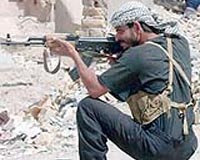 |
Baghdad (UPI) Oct 1, 2010 The Pentagon has proposed selling arms worth $4.2 billion to Iraq as it drives to bolster the country's new-era military amid the U.S. withdrawal and to provide Persian Gulf states with massive infusions of advanced weaponry to stand up to Iran. The package proposed by the Department of Defense this week includes 18 Lockheed Martin F-16 strike jets, Raytheon AIM-9 Sidewinder air-to-air, heat-seeking missiles for dogfighting, laser-guided bombs and reconnaissance equipment. The Pentagon said the sale would make Baghdad "a more valuable partner in an important area of the world as well as supporting Iraq's legitimate needs" regarding self-defense. This comes hard on the heels of the unveiling of plans by U.S. President Barack Obama's administration to provide Saudi Arabia with 84 advanced Boeing F-15SA aircraft, some 200 helicopters, including Boeing's state-of-the-art AH-64 Apache gunships, and other systems worth at least $60.5 billion. Clearly building up Iraq's military capabilities falls within U.S. efforts to isolate and contain an expansionist Iran, which in the space of two decades has been transformed from a regional irritant to military power alleged to be on the cusp of producing nuclear weapons. But this outpouring of weaponry for Arab states, whose relations with the United States are less cozy than they were a decade ago, is meeting criticism in Washington. And arming Iraq, which under the late Saddam Hussein twice invaded its neighbors and was seen as the bully on the block, has caused some murmurs in the Gulf Arab states themselves. Providing post-Saddam Iraq with 18 F-16s doesn't by any means transform it into a military power but Baghdad eventually wants 96 of them and arming them with Sidewinder missiles, which are designed to shoot down other aircraft, clearly is a move toward giving Iraq offensive capabilities rather than simply countering insurgencies. The Financial Times reports that the watchdog U.S. Government Accountability Office questioned in a recent report seen by the London business daily whether these big-ticket arms sales, among the largest ever proposed by a U.S. administration, are in the national interest. The report expresses concern that "U.S. priorities are not consistently considered before such sales are authorized." Since Congress has yet to approve these arms sales, the Financial Times said "the GAO report is likely to raise questions over future sales plans." In an audit of 15 authorized commercial weapons sales and 13 foreign military sales to six gulf countries, worth around $22 billion, in 2005-09, the GAO said the State Department "did not document how it applied criteria to review arms transfers." The report noted, "As arms transfer authorizations increase to this part of the world, the U.S. government needs to ensure than it reviews requests for arms transfers, especially for significant military equipment, for their foreign policy and national security implications." It remains to be seen whether these huge arms sales will help curb Iran or simply antagonize it into pursuing its alleged objective of developing nuclear weapons and the ballistic missiles to carry them to threaten regional states, such as Saudi Arabia and Israel. The U.S. efforts to rearm Iraq's new military forces are intended to ensure that the post-Saddam state remains within the U.S. sphere of influence rather than becoming an Iranian satellite. But the Iranians appear to be currently stepping up their campaign to install a Shiite-dominated government that leans toward Tehran. This involved covert political action as well as paramilitary operations. As the U.S. military drawdown proceeds, with all U.S. forces scheduled to be out of Iraq by the end of 2011, the Americans continue their transfer of weapons even as the country struggles to form a coalition government six months after a stalemated parliamentary election. On Sunday, the Iraqi navy inaugurated its first U.S.-built Swift Class patrol boat at Umm Qasr, Iraq's main port at the northern end of the gulf. Iraq is to take delivery of 14 more of these $20 million, 50-foot craft before U.S. forces depart. The high-speed vessels' main mission will be to protect the oil terminals at al-Basra and Khor al-Amiya through which some 1.7 million barrels a day are loaded into tankers for export. Two U.S.-built offshore support vessels, each costing $70 million, are expected to be delivered in 2011.
Share This Article With Planet Earth
Related Links Iraq: The first technology war of the 21st century
 Iraq: Return of Sheibani's killer squads
Iraq: Return of Sheibani's killer squadsBaghdad (UPI) Sep 30, 2010 The return of Iranian-backed Shiite "Special Groups" who were behind much of the killing in Iraq in 2005-08 has thrust one of Tehran's most notorious warlords, Abu Mustafa al-Sheibani, back into the limelight. His outfit, known as the Sheibani Network, and another called Asaib al-Haq, or League of the Righteous, was responsible for some of the worst sectarian bloodshed in Iraq. U ... read more |
|
| The content herein, unless otherwise known to be public domain, are Copyright 1995-2010 - SpaceDaily. AFP and UPI Wire Stories are copyright Agence France-Presse and United Press International. ESA Portal Reports are copyright European Space Agency. All NASA sourced material is public domain. Additional copyrights may apply in whole or part to other bona fide parties. Advertising does not imply endorsement,agreement or approval of any opinions, statements or information provided by SpaceDaily on any Web page published or hosted by SpaceDaily. Privacy Statement |